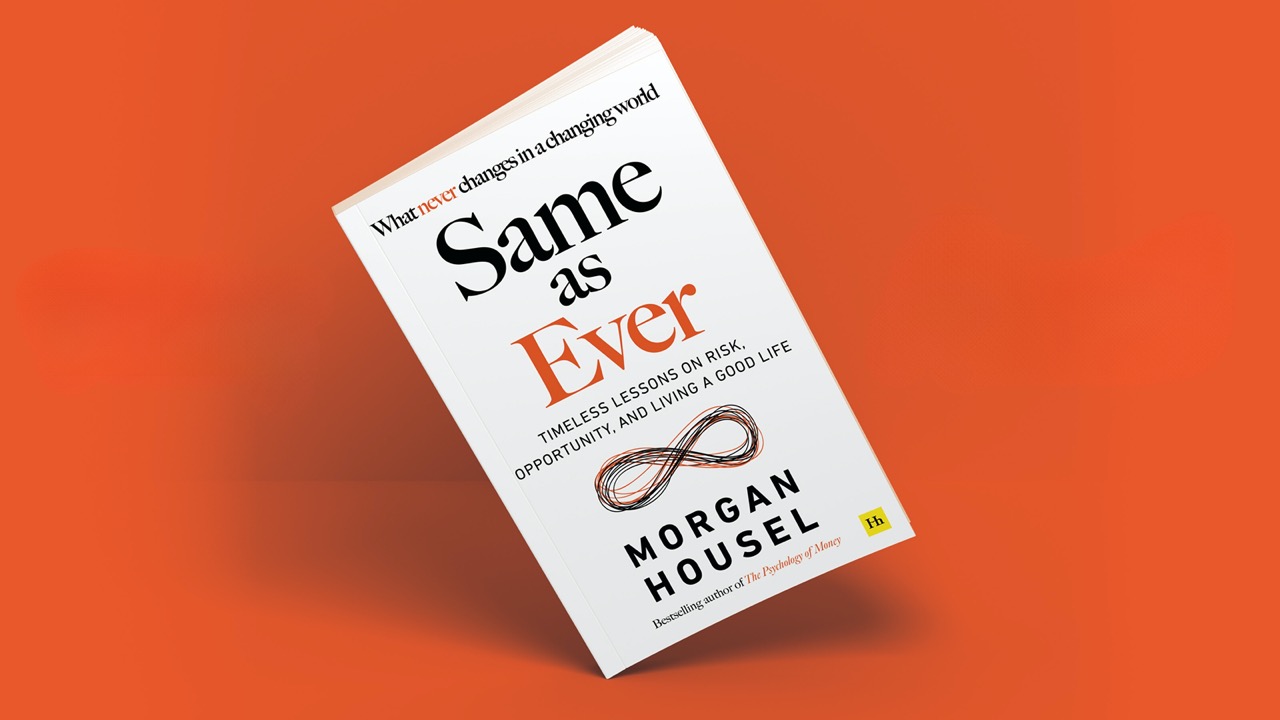Same as Ever Summary

## Same as Ever ## Summary
Same as Ever is a collection of 23 short stories highlighting timeless human flaws and patterns to help you make better financial and life decisions based on the things that never change instead of trying to predict the future.In late 2009, the economy was in shambles. The US housing crisis had escalated into “the Great Recession,” and even in a small town like Omaha, Nebraska, the streets were empty, and business looked bleak. Driving around with famed investor Warren Buffett, a friend worried how the country would ever bounce back.
Undeterred, Warren said: “What was the best-selling candy bar in 1962? Do you know?” “No,” his friend replied. “Snickers,” Warren said. “And do you know what candy bar sells best today? Snickers.” That’s all Warren had to say on the matter. His message? Some things change. Others don’t. In investing, only the latter category matters.
Morgan Housel is a partner at Collaborative Fund, popular finance blogger, and the author of The Psychology of Money, which sold over 4 million copies. With the above story, he opens his new bestseller, Same as Ever. The book is a collection of short stories about “what never changes in a changing world.” Understanding what stays the same will help us make better financial, personal, and career decisions, Housel suggests.
Here are 3 lessons from the book to help you do just that:
- It’s impossible to predict the future, but human behavior provides a stable guideline for making choices.
- Markets are swayed by stories more so than by statistics.
- Unless you’ve experienced them yourself, some hard lessons will never settle in.
Let’s discover what we can bank on for years to come — maybe even literally!
Lesson 1: Base your decisions on people’s behavior, not events, because history keeps reminding us that the world is unpredictable.
Life hangs by a thread, and so does history. That’s Housel’s first assertion. He recounts how, as a teenager, by complete chance, he skipped skiing down a dangerous slope for the second time with two of his friends. They both died in an avalanche. Though hopefully not as drastic, we’ve all experienced moments like this. Split-second decisions shape our lives all the time.
Similarly, Housel explains how, had the wind been in favor of the British fleet in 1776, George Washington might not have survived the Battle of Long Island. No Washington, no United States.
In 1915, mathematician David Hilbert began working on Einstein’s unfinished theory of general relativity for fun. Afraid Hilbert would solve it first, Einstein buckled down and completed it a few months later. No competition, no general relativity.
The list of “butterfly effect moments,” tiny occurrences that end up shaping world history or our personal lives dramatically, is endless. Most recently, the pandemic, Russia’s invasion of Ukraine, and the Israel-Hamas war keep reminding us: Life is unpredictable, but human behavior isn’t.
No matter what the world will look like in 2050, “people will still respond to greed, fear, opportunity, exploitation, risk, uncertainty, tribal affiliations and social persuasion in the same way,” Housel bets.
That’s why Warren Buffett likes to invest in insurance companies, bubble gum makers, and Heinz Ketchup: People will always want to feel safe, chew gum, and put sauce on their burgers.
When you make decisions and predictions, financial or otherwise, consider human behavior, not specific events.
Lesson 2: Stories drive markets because a great story will always be more compelling than even the best statistic.
As an investor in crypto since 2017, I can’t tell you how many narratives I’ve seen take Twitter by storm. For a while it was Bitcoin’s acceptance as an official currency that would “send its price to the moon.” Then it was companies putting it on their balance sheet. Then it was the Lightning Network. Oh, and let’s not forget the mythical Bitcoin ETF.
Of course, there were just as many “It’s over” stories. Nearly 500 “Bitcoin Obituaries” have claimed the orange coin is dead over the years. And while no story, good or bad, has yet managed to get Bitcoin to either infinity or zero, narratives like these break statistics all the time.
Take investor PlanB‘s stock-to-flow model for predicting Bitcoin’s price. The coin has left the model’s range many times, and yet, investors hold on to it, and the creator keeps updating it. Why? It’s just too good of a narrative. The story is more compelling than the data.
Housel points to Yuval Noah Harari’s own disbelief at his history book, Sapiens, selling tens of millions of copies: “I did zero new research. It was reading the common knowledge and just presenting it in a new way.” But the writing was beautiful, and so the story took off.
When investing but also otherwise, always look for the story. Humans prefer tales over tells, and that will likely never change.
Lesson 3: Some lessons, we can’t learn until we experience them firsthand.
I read All Quiet on the Western Front by Erich Maria Remarque in high school. At first, the young Paul Bäumer and his friends are excited to join World War I. As soon as the first bullets fly and their comrades die in ditches, however, they all become terrified children.
Some things in life, you can’t truly comprehend until you experience them yourself. “Most actions have two sides: skill and behavior,” Housel writes in the blog post corresponding to his “Now You Get It” chapter in the book. “What’s true in theory vs. how it feels in the moment. The gap between the two can be a mile wide.” Experiences you’ll have to make firsthand include both outsized success and losing 30% of your money or more, for example.
Going back to my crypto foray in 2017, I invested some $20,000 into the space, most of my assets at the time. The money quickly ballooned into a $300,000 portfolio — but I didn’t feel any different. I still went to work, ate normal food, and slept poorly on some days.
Less than a year later, my coins had dropped 90%. I kept investing, but now, I had only $30,000 left. They eventually recovered, but man, it was a scary time. The volatile crypto markets aren’t for everyone. Unless you’ve felt those swings, however, no amount of data, reading, or stories from friends can convey what it’s like.
Every generation is condemned to learn some hard lessons for themselves. That, too, will never change. Don’t feel bad about making mistakes others have made before. Just make sure you don’t repeat them, and your future, financial and otherwise, will always look a little brighter than the past.
Credit to : https://fourminutebooks.com/same-as-ever-summary/#more-10995







